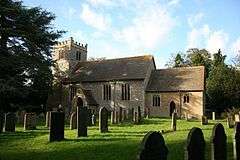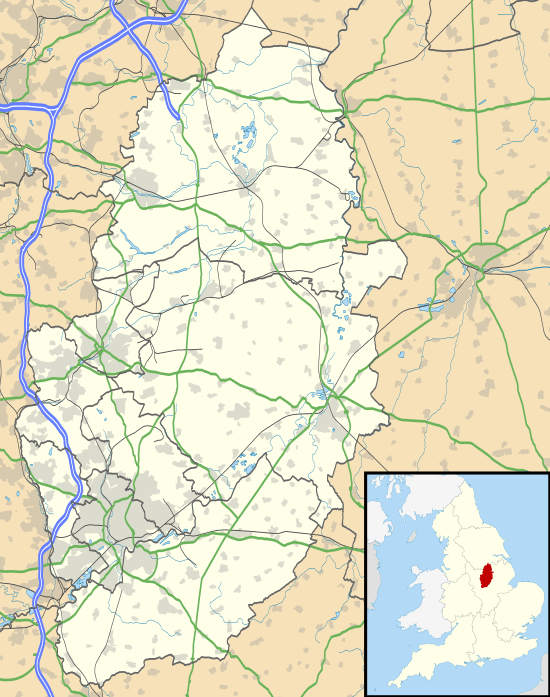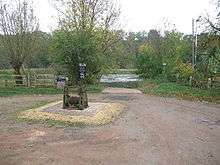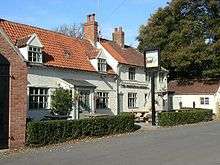Bleasby, Nottinghamshire
Bleasby is a village and civil parish in Nottinghamshire, England, located 15 mi northeast of Nottingham. It has a population of 804,[1] increasing to 824 (and including Goverton) at the 2011 Census.[2]
| Bleasby | |
|---|---|
 St Mary's Church, Bleasby | |
 Bleasby Location within Nottinghamshire | |
| Population | 824 (2011) |
| OS grid reference | SK7149 |
| Civil parish |
|
| District |
|
| Shire county | |
| Region | |
| Country | England |
| Sovereign state | United Kingdom |
| Post town | NOTTINGHAM |
| Postcode district | NG14 |
| Dialling code | 01636 |
| Police | Nottinghamshire |
| Fire | Nottinghamshire |
| Ambulance | East Midlands |
| UK Parliament | |
The village was served by a Post Office until early 2015,[3] railway station and tea shop. The Saxon charter of 956 records Bleasby as Blisetune, named after a Danish soldier Blesi and tun the Anglo-Saxon word for settlement. Bleasby was the childhood home of William Booth, the founder of The Salvation Army.
Hazelford Ferry
Before the building of the first Gunthorpe Bridge in 1875, it was an important crossing point over the River Trent at the Hazelford Ferry (grid reference SK725488). This was the main route to Lincoln and the coast at Grimsby avoiding expensive bridges at Newark and Nottingham. The ferry continued operating until well after the second world war as a recreational facility as it was adjacent to The Star & Garter public house. The public house has now been converted to a residential home for the elderly and the ferry has ceased operation (although the winding gear has been preserved on the North bank).[4][5]

This location was thought to be the point where King Charles I crossed the Trent on his way to negotiate with the Scots at Southwell, prior to his eventual capture. It was the only part of the Trent close enough to Southwell that was fordable at the time and was far enough away from the Scots garrisoned at Kelham.
Perhaps more importantly it was the site of the baptism of the Saxon court of King Edwin in 627AD. King Edwin was king of all England with the exception of Kent and wished to marry Ethelburgh, the daughter of Ethelbert king of Kent. The problem being that Edwin was Pagan and Ethelbert being a Christian would only allow the marriage if Edwin would convert. Following the marriage on 625AD which for the first time unified the whole of England, the court of Edwin descended upon Bleasby, the Trent considered to be equidistant from Kent and Northumbria, and were all baptised in the shallow waters there by the Roman priest, Paulinus, who later became the first Archbishop of York.
Additional information

Bleasby has a public house near St Mary's, the local parish church,[6] a primary school, three caravan sites for holiday/weekend homes and a walking route around the Jubilee Ponds. The Trent Valley Way passes along the riverbank at this point.[7][8][9][10]
The Trent Powerboat and Ski Club (TPSC) operate at Hazleford north bank, one of four areas nearby on the River Trent[11]
References
- "Area:Bleasby CP (Parish)"
- "Civil Parish population". Neighbourhood Statistics. Office foer National Statistics. Retrieved 5 April 2016.
- Shop and Post Office Archived 28 May 2014 at the Wayback Machine Retrieved 6 July 2014
- "Archived copy". Archived from the original on 15 February 2014. Retrieved 27 July 2013.CS1 maint: archived copy as title (link)
- Hazelford – A Care Home For The Elderly Archived 4 June 2014 at the Wayback Machine Retrieved 6 July 2014
- British Listed Buildings St Mary's Church, Bleasby Retrieved 6 July 2014
- Ordnance Survey (2009). 129 Nottingham and Lougborough. OS Landranger Map Series. Ordnance Survey. ISBN 9780319231623.
- Waggon and Horses Archived 14 July 2014 at the Wayback Machine Nottingham Post Retrieved 6 July 2014
- Caravan Owners Club Retrieved 6 July 2014
- Motorhome Living Archived 14 July 2014 at the Wayback Machine Retrieved 6 July 2014
- TPSC Retrieved 6 July 2014